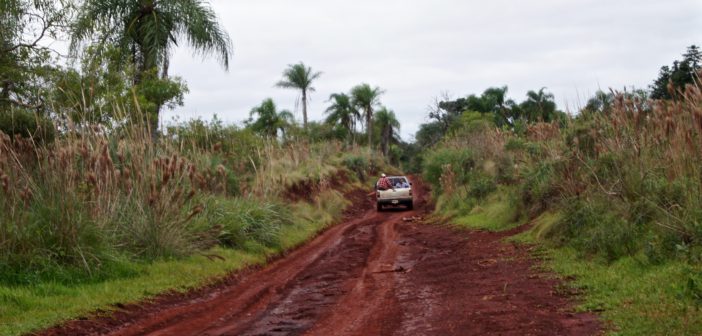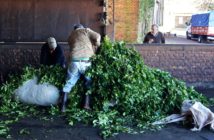The following piece is the first of three installments about the production of Yerba Mate and its cultural and economic impacts of Argentina, Paraguay, and Uruguay.
The bones of deceased Guaraní shamans used to decorate forest pockets in pre-colonial times, when Mata Atlântica, “The Atlantic Forest,” still stretched out its arms across South America. From modern-day northeastern Argentina to the southern Brazilian coast, the “Atlantic Forest” provided the continent’s First Nations with a lush diversity of ecoregions to explore, to wander and live in. When seventeenth-century Jesuit missionaries found out about these spiritual temples, they persuaded the natives to lead the way to the holy grounds.
In the end, when Colonialism had established its new world order, and the Guaraní’s spiritual mobility limited, the shamans’ bones ended up six feet underground, in accordance with Christian custom. In early missionary chronicles, the Jesuit priest António Ruiz de Montoya retells the Guaraní’s testaments of the buried shaman’s cries into the night: “Let me out, I can’t breathe down here!”
A New World sprang forth from the earth, and a storm followed in its tracks.
* * *
Roque Pereira recalls the frosty morning when his father, for the first time, brought him along to work at the maté plantations. His father was a tarefero, a leaf picker – and from that day on, so was his son.
“I was eleven,” says Roque and opens the window in a damp and chill kitchen. He is at the headquarters of Asociación de Tareferos, or ADT, in central Oberá, Argentina. He lets in Saturday’s heavy rain and another heartfelt memory from the decades on the plantations. “Weekends equals bad luck for tareferos. No work, and no money. Nada.”
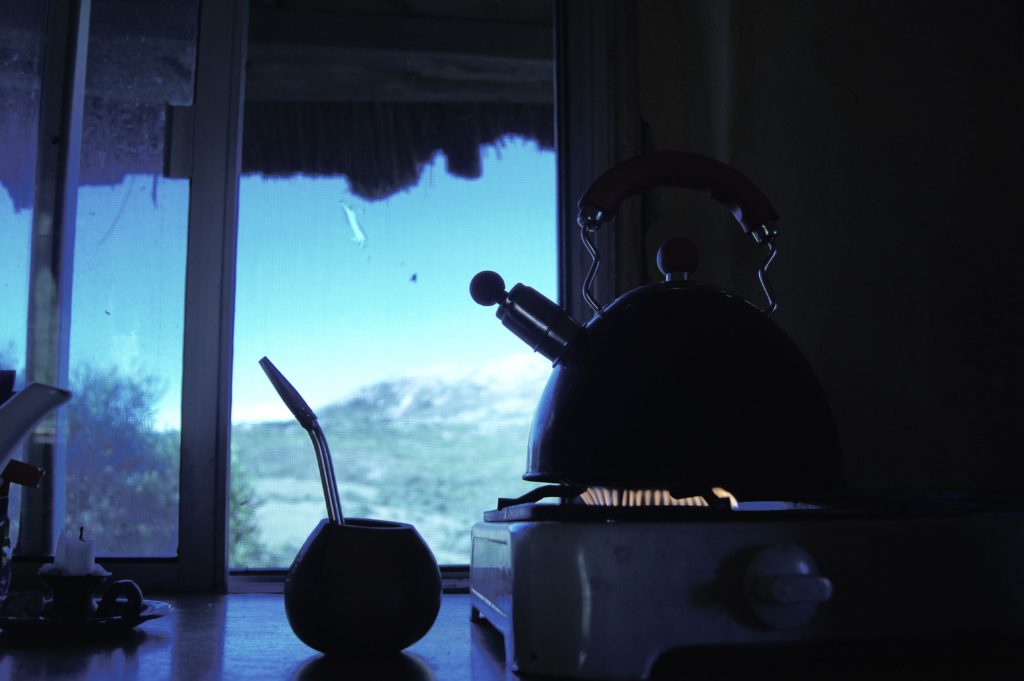
He then empties the maté gourd and watches while the shredded leaves fall into the garden soil. A circle is closed. Once claimed from the earth, now re-grounded.
Roque leaves the window ajar while he lights the gas stove and collects his thermos from a cupboard, under a damp portrait of Evita Perón. He first pours cold water into the thermos before he fills the kettle. In the maté consumer’s private world it’s about ceremonies, but in the plantation fields and industrial practice it’s all about roots. About cultural, political and social links that intertwine workers and producers, man and nature, poverty and wealth. Remove one piece, and the center cannot hold.
“It’s all about paving way for a better tomorrow for our children, the next generation,” says Roque. “But we can’t do it alone, we need new structures.”
As a Guaraní, and a member of Argentina’s indigenous and most poverty-stricken minority, justice has never seemed more than a word. A distant dream. The reality for the taraferos is a life marred by cuts from branches and a body bent from mile after mile of carrying sacks of maté leaves. Life in the shade of development, an existence at the political and economic bottom.
“But without my efforts, without the cuts in my hands and the sweat on my forehead – no maté,” he says.
* * *
Tareferos get paid by the pound, and delivery of maté leaves equals survival. Every sack weighs 200 lbs., which the tarefero carries on his back through thick vegetation to a waiting truck. The truck is waiting to leave for a mill owned by one of the industry’s big guns. The arrival at the mill signals the end of the tarefero’s contribution; at the mill, the leaves and branches are exposed to heat, dropped on liquid, and dried. The maté is then aged for nine months prior to departure for store shelves. Online, one can purchase a pound of processed maté leaves for a handful of dollars. The tarefero earns 80 centavos per kilo, or $0.01, leaving him with a daily salary of two dollars – assuming the tarefero provides the truck with two full sacks.
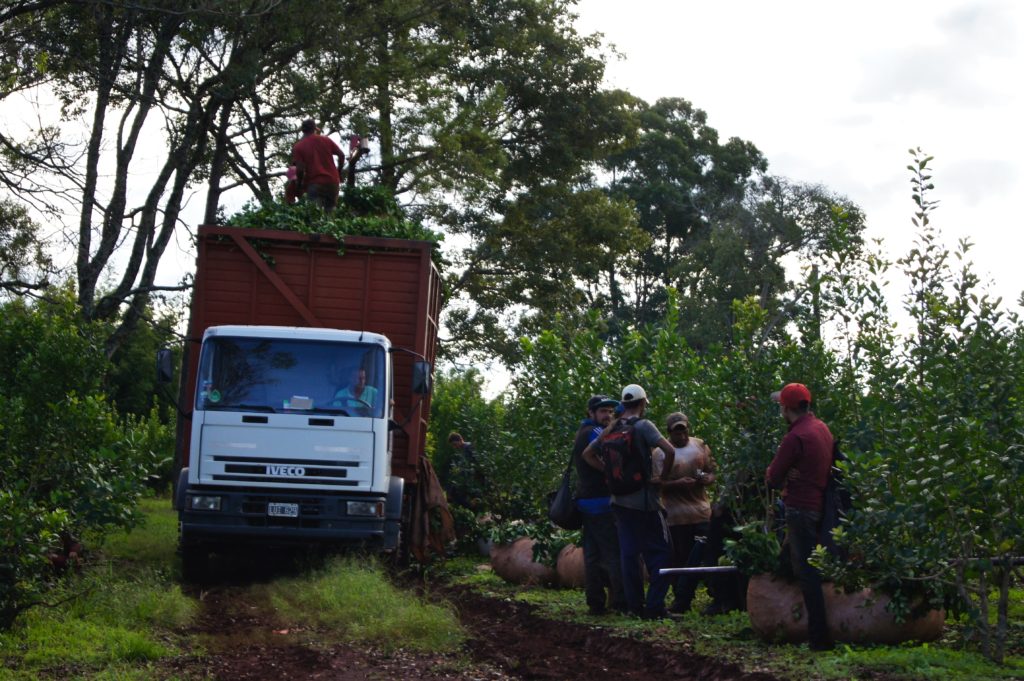
The ADT union was officially founded in 2011, although tareferos started to organize themselves back in 2002. The Argentine neoliberal economic experiment had ruined a whole country and cast thousands, if not millions, of people into hunger and despair. Misiones’s maté industry was severely weakened, and companies had to adjust to a new reality while famine struck the Guaraní people. Tareferos, whose families relied on their meager incomes, were left without a livelihood.
In 2011, then-President Cristina Fernández de Kirchner had Law 26.727 passed through the senate, securing basic labor rights for around one million rural workers, many involved in maté production. These rights included minimum wages, paternal leave for 30 days, and a maximum of eight working hours per day.
“It got better for a while,” says Roque Pereira. “But many of the promises of inspections and collecting information about the workers, to provide them with paper and legality, were never kept.”
And now, with the return of the IMF-regulated policy, under the presidency of Mauricio Macri, few tareferos discern light at the end of the economically troubled tunnel. The provinces paid a high price for the neoliberal government’s Russian roulette game with the country’s currency. The Argentine peso was tied to the US dollar, and the IMF imposed an austerity package. That package meant loosened labor rights, further privatization, and less budget means for welfare sectors. And in a province like Misiones, maté workers paid the ultimate price for a national debt that never contributed to livelihoods. A whole country was taken hostage by international monetary institutions and private banks, and then – when Macri again in 2018 turned to IMF for a $60 billion loan – history repeated itself.
“Once again, we – and then I refer to the working class of Argentina, and in particular workers in heavy industries such as the maté production – had to pay the price for this neoliberal dream that everything improves, only if you liberate it all and cast it to the market. Well, twice since the turn of this century, facts have proven the economics wrong.”
ADT struggles to make the interests of the tareferos heard from a position at the rock bottom of a multi-billion-dollar industry. Public outcry in protest of skyrocketed maté prices occasionally make national headlines – tarefero’s demands for better wages and improved working conditions, however, seldom make headway in the local press.
The kettle on the stove beeps and steams. Roque Pereira pours fresh leaves into the gourd and sips using a bombilla, an iron straw. The bitter smell of maté fills the kitchen while he sinks into memories. After a few sips, he looks upon the wall where a drawing – a gift from his daughter – shows a tarefero with a bent back, carrying a sack of leaves. The burden is visible in the eyes of the image, the same glance Roque Pereira’s own children used to find in their family’s sole provider.
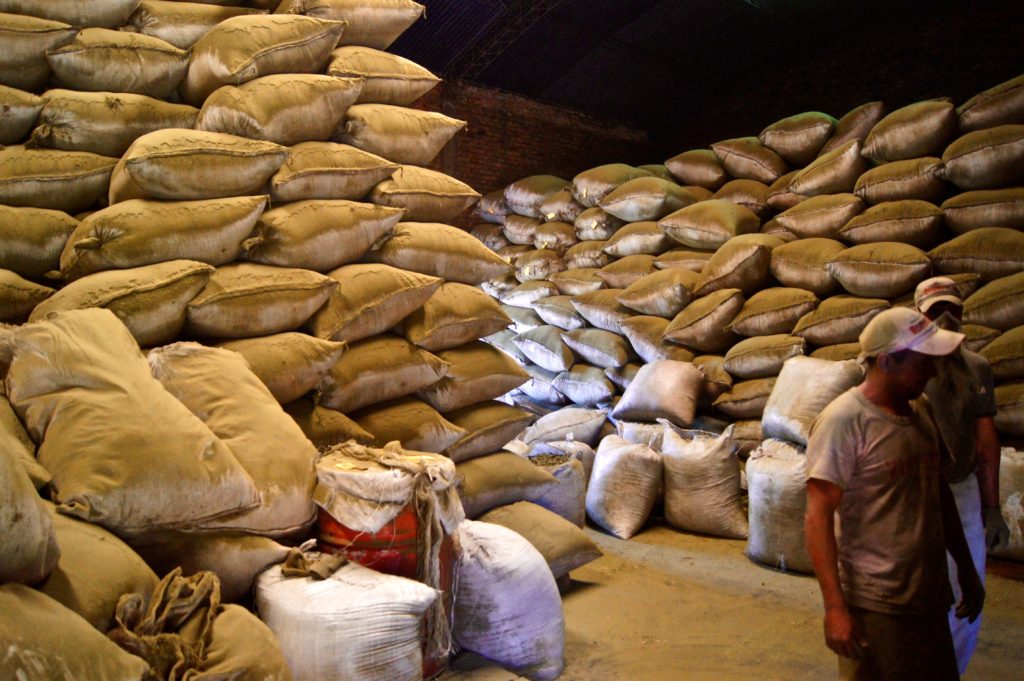
“For me, it started like it normally does in this occupation,” he explains. “After decades of cutting, carrying and dragging, you start to notice the downfall of knees and back. This is the moment when my own father, along with many other parents before and nowadays, decided that he couldn’t provide for his family alone. He needed help and introduced me to the work. Many people have no choice, poverty in Argentina keeps many children away from school.”
Three children died in 2013 when a truck carrying tareferos and harvested leaves overturned on its way to a mill not far from Oberá. It was not the first time that children died in maté country, but the tragic incident awoke a national outcry. There were demands for stricter regulations and controls to crack down on modern slavery and child labor.
“Look,” laments Roque, “We’ve heard a lot of sweet and concerned voices about the welfare of tareferos throughout the years. But in the end, it’s never been more action than words.”
For Roque Pereira, who underlines his luck at no longer working out in the fields, but at the ADT Oberá headquarters, every fatal accident involving a child is a remembrance of the industry’s historically bloody roots.
“In my family, child labor ends with me,” says Roque Pereira. “My children are going to school, they educate themselves, and will never work as tareferos. Education is the magic spell that’ll break my family curse.”
Photos were taken and kindly provided by the author, Klas Lundstrom.

About the author: Klas Lundstrom (b. 1982) is a self-taught writer and journalist based in Stockholm, Sweden. He started writing as an eleven-year-old trying to cope with the death of his father. Author of numerous nonfiction books on, e.g., the U.S. uranium industry and its social and environmental impacts, Latin America’s forgotten regions, and East Timor’s walk from Indonesian occupation to U.N. colony. As a reporter, he has contributed numerous media outlets throughout the years, e.g. The Guardian, The Jakarta Post, and TT, Sweden’s equivalent to Associated Press. He has lived in both Brazil and Uruguay and is a dedicated yerba maté consumer and hopes that his reporting on the maté industry can help other consumers understanding the business, and thus make more ethical and aware choices regarding products, companies, and origin.
Learn more about Klas Lundstrom, and follow him on Twitter.

